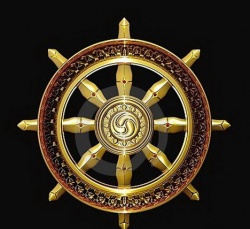Difference between revisions of "Gyochi"
(Created page with " Gyochi 行智 (n.d.) A lay priest and a member of the ruling Hojoclan in Japan during the time of Nichiren (1222-1282). Though not ordained, he act...") |
|||
| Line 1: | Line 1: | ||
| − | + | {{DisplayImages|188}} | |
[[Gyochi]] [[行智]] (n.d.) | [[Gyochi]] [[行智]] (n.d.) | ||
| − | A lay [[priest]] and a member of the ruling Hojoclan in [[Japan]] during the time of [[Nichiren]] (1222-1282). Though not [[ordained]], he acted as the deputy [[chief priest]] of [[Ryusen-ji]], a [[temple]] of the [[Tendai school]] in [[Atsuhara]] Village of {{Wiki|Suruga Province}}. His full [[name]] and title were Hei no Sakon NyudoGyochi. He privatized some of the temple's property, extracted bribes from a thief he made a [[priest]] and allowed him to reside at the [[temple]], and had {{Wiki|farmers}} of his parish hunt and cook quails, raccoon {{Wiki|dogs}}, and {{Wiki|deer}}, and serve the meat to him at the chief priest's quarters. [[Nikko]], later [[Nichiren's]] successor, converted several {{Wiki|priests}} of the [[temple]], including [[Nisshu]], [[Nichiben]], and [[Nichizen]], to [[Nichiren's]] [[teaching]]. This angered [[Gyochi]], who unlawfully instigated official harassment of [[Nichiren's]] followers that led to the imprisonment of twenty of them, all {{Wiki|farmers}}. They were sent to [[Wikipedia:Kamakura, Kanagawa|Kamakura]], where three of them were beheaded and the others banished from [[Atsuhara]] in 1279. These acts of oppression became known collectively as the [[Atsuhara Persecution]]. See also [[Atsuhara Persecution]]. | + | A lay [[priest]] and a member of the ruling [[Hojoclan]] in [[Japan]] during the time of [[Nichiren]] (1222-1282). Though not [[ordained]], he acted as the deputy [[chief priest]] of [[Ryusen-ji]], a [[temple]] of the [[Tendai school]] in [[Atsuhara]] Village of {{Wiki|Suruga Province}}. |
| + | |||
| + | His full [[name]] and title were [[Hei no Sakon NyudoGyochi]]. | ||
| + | |||
| + | He privatized some of the temple's property, extracted bribes from a thief he made a [[priest]] and allowed him to reside at the [[temple]], and had {{Wiki|farmers}} of his parish hunt and cook quails, raccoon {{Wiki|dogs}}, and {{Wiki|deer}}, and serve the meat to him at the chief priest's quarters. [[Nikko]], later [[Nichiren's]] successor, converted several {{Wiki|priests}} of the [[temple]], including [[Nisshu]], [[Nichiben]], and [[Nichizen]], to [[Nichiren's]] [[teaching]]. | ||
| + | |||
| + | This angered [[Gyochi]], who unlawfully instigated official harassment of [[Nichiren's]] followers that led to the imprisonment of twenty of them, all {{Wiki|farmers}}. They were sent to [[Wikipedia:Kamakura, Kanagawa|Kamakura]], where three of them were beheaded and the others banished from [[Atsuhara]] in 1279. These acts of oppression became known collectively as the [[Atsuhara Persecution]]. | ||
| + | |||
| + | See also [[Atsuhara Persecution]]. | ||
| + | {{R}} | ||
| + | [http://www.sgilibrary.org/search_dict.php] | ||
| + | [[Category:Nichiren]] | ||
Latest revision as of 03:05, 27 September 2015
A lay priest and a member of the ruling Hojoclan in Japan during the time of Nichiren (1222-1282). Though not ordained, he acted as the deputy chief priest of Ryusen-ji, a temple of the Tendai school in Atsuhara Village of Suruga Province.
His full name and title were Hei no Sakon NyudoGyochi.
He privatized some of the temple's property, extracted bribes from a thief he made a priest and allowed him to reside at the temple, and had farmers of his parish hunt and cook quails, raccoon dogs, and deer, and serve the meat to him at the chief priest's quarters. Nikko, later Nichiren's successor, converted several priests of the temple, including Nisshu, Nichiben, and Nichizen, to Nichiren's teaching.
This angered Gyochi, who unlawfully instigated official harassment of Nichiren's followers that led to the imprisonment of twenty of them, all farmers. They were sent to Kamakura, where three of them were beheaded and the others banished from Atsuhara in 1279. These acts of oppression became known collectively as the Atsuhara Persecution.
See also Atsuhara Persecution.
